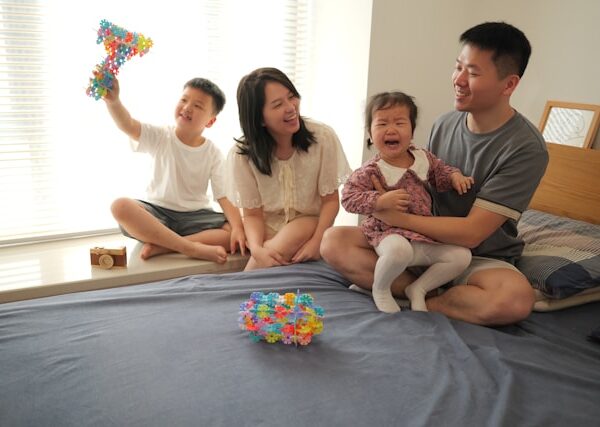First posted to: https://surehopecounseling.com/healing-from-family-of-origin-wounds-the-authoritarian-parent/

Parenting. Arguably one of the most challenging and rewarding roles that a person can take on in life. A role we are often expected to just know how to perform because we have been parented for most of our early lives. For some, this “on-the-job” training has instilled a sense of security that has effectively launched us into adulthood, preparing us in many ways for the monumental task of raising our own children. For others, this training has seemingly ingrained undesirable patterns of relating that feel etched into our brains. We may wholeheartedly determine to parent differently. However, we often find ourselves disappointed that we repeat some of the same unhealthy parenting patterns with our own children. This can feel so frustrating for those who truly desire to provide a healthy and loving environment for their children but can’t find a way out of this cycle.
The goal is not to be critical of our parents, as our parents were likely taught with the same on-the-job parent training as we were. Our purpose is to better understand the impact of certain parenting practices. Increased understanding may help us to better identify areas we would like to change in our own parenting. It might also be an opportunity for us to explore wounds in need of healing and mend relationships in need of repair.
According to Diana Baumrind, clinical and developmental psychologist, parenting styles are often defined based on their level of demand and responsiveness. A style known as Authoritarian parenting is where parents tend to demand much of their children without being responsive and relational. Dr. Danny Huerta in his Focus on the Family post Why Authoritarian Parenting Falls Short shares that the “intention (with the Authoritarian style) is often to raise responsible, successful, and confident children with a Christian faith.” However, he continues on to say that “so much focus may be placed on the rules of scripture, responsibility, and the success of their kids that they miss out on the incredible transformation and joy found in relationship.” Imagine focusing all of your attention on the rules and missing your child’s testimony! Warmth, nurturing, fun, guidance, and trust for a child’s ability to make good choices are often missing having been replaced by a “my way or the highway approach.” This Authoritarian approach may display high levels of control and unrealistically high expectations. Rules are often strict and unwritten. Few choices are given as well as little opportunity for negotiation. Punishment is typically administered with criticism and evokes shame with language such as “Why can’t you do anything right?” “Because I said so,” “How many times do I have to tell you that?”
It’s not surprising if you recognize some of these elements from your own parenting or from that of your parents. You are not alone. Authoritarian Parenting was the primary style of parenting through the 1950’s and continues to be passed down as an accepted practice in many homes today. Some people are learning from their own experiences, making attempts to modify their parenting style. They work to balance expectations with increased responsiveness in focusing more on building healthy relationships with their children. This shift in parenting is important for the believer as it resembles how God has created us to be relational beings. He calls us to honor one another as His children within each of our relationships. Jesus commands in John 13:34-35 to “Love one another. As I have loved you, so you must love one another. 35 By this everyone will know that you are my disciples, if you love one another” (NIV). He also emphasizes the value of children when he invites them to come to Him in Matthew 19:14. He never sanctioned harsh, domineering control. Instead, His example calls for nurturing and protecting children’s well-being. Many of us recall the verse to “Honor your father and mother” from Exodus 20:12 which is reiterated in Ephesians 6:2. Equally as important, this passage also stresses a parent’s responsibility to raise a child with love and righteousness and not to parent in a way that “provokes your children to wrath but instead brings them up in the discipline and instruction of the Lord” (Ephesians 6:4).
The absence of parental responsiveness, nurturing, and the lack of relationship have been found to inflict deep wounds within a child that may be carried into adulthood. These wounds are difficult to heal. This is often evident in struggles with self-esteem and increased feelings of worthlessness. There may be difficulty expressing and managing emotions or problems with authority. Impaired social skills or issues with self-control (including a pull toward addictive behaviors) can also be evident in this type of parental wound. Thankfully, this is not a place in which we have to stay. Healing from past hurts is available to us as believers. Psalm 147:3 states, “He heals the brokenhearted and binds up their wounds” (NIV). Through the power of the Holy Spirit, we are able to humbly approach the Lord, surrender our control to fix ourselves, and allow God’s transformative power to lead us to a place of forgiveness, healing, and hope in Him.
-Mickey Jensen – learn more about working with Mickey here!
References:
(n.d.). BibleGateway.com: A searchable online Bible in over 150 versions and 50 languages. https://biblegateway.com
Which parenting style is best; Pro’s and con’s of the four types. (n.d.). Wellspring Center for Prevention. https://wellspringprevention.org/blog/pros-cons-parenting-styles/#:~:text=Lack%20of%20Emotional%20Development%3A%20Children,emotional%20difficulties%20later%20in%20life
Why Authoritarian Parenting Falls Short. (n.d.). Focus on the Family. https://www.focusonthefamily.com/parenting/why-authoritarian-parenting-falls-short/



Leave a Reply
You must be logged in to post a comment.